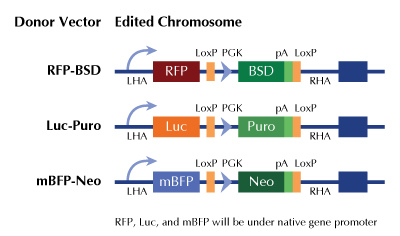MCK10 (DDR1) Human Gene Knockout Kit (CRISPR)
CAT#: KN201224BN
DDR1 - human gene knockout kit via CRISPR, HDR mediated
Functional Cassette: GFP-puro Luciferase-Puro RFP-BSD
HDR-mediated knockout kit validation
USD 1,657.00
4 Weeks*
USD 450.00
USD 1,254.00
Specifications
| Product Data | |
| Format | 2 gRNA vectors, 1 mBFP-Neo donor, 1 scramble control |
| Donor DNA | mBFP-Neo |
| Symbol | MCK10 |
| Locus ID | 780 |
| Components |
KN201224G1, MCK10 gRNA vector 1 in pCas-Guide CRISPR vector KN201224G2, MCK10 gRNA vector 2 in pCas-Guide CRISPR vector KN201224BND, donor DNA containing left and right homologous arms and mBFP-Neo functional cassette. GE100003, scramble sequence in pCas-Guide vector |
| Disclaimer | These products are manufactured and supplied by OriGene under license from ERS. The kit is designed based on the best knowledge of CRISPR technology. The system has been functionally validated for knocking-in the cassette downstream the native promoter. The efficiency of the knock-out varies due to the nature of the biology and the complexity of the experimental process. |
| Reference Data | |
| RefSeq | NM_001202521, NM_001202522, NM_001202523, NM_001297652, NM_001297653, NM_001297654, NM_001954, NM_013993, NM_013994 |
| UniProt ID | Q08345 |
| Synonyms | CAK; CD167; DDR; EDDR1; HGK2; MCK10; NEP; NTRK4; PTK3; PTK3A; RTK6; TRKE |
| Summary | Receptor tyrosine kinases play a key role in the communication of cells with their microenvironment. These kinases are involved in the regulation of cell growth, differentiation and metabolism. The protein encoded by this gene belongs to a subfamily of tyrosine kinase receptors with homology to Dictyostelium discoideum protein discoidin I in their extracellular domain, and that are activated by various types of collagen. Expression of this protein is restricted to epithelial cells, particularly in the kidney, lung, gastrointestinal tract, and brain. In addition, it has been shown to be significantly overexpressed in several human tumors. Alternatively spliced transcript variants encoding different isoforms have been described for this gene. [provided by RefSeq, Feb 2011] |
Documents
| Product Manuals |
| FAQs |
| SDS |
Resources
Other Versions
| SKU | Description | Size | Price |
|---|---|---|---|
| KN201224 | DDR1 - human gene knockout kit via CRISPR, HDR mediated |
USD 1,657.00 |
|
| KN201224LP | DDR1 - human gene knockout kit via CRISPR, HDR mediated |
USD 1,657.00 |
|
| KN201224RB | DDR1 - human gene knockout kit via CRISPR, HDR mediated |
USD 1,657.00 |
|
| KN401224 | DDR1 - KN2.0, Human gene knockout kit via CRISPR, non-homology mediated. |
USD 1,657.00 |
|
| GA100545 | DDR1 CRISPRa kit - CRISPR gene activation of human discoidin domain receptor tyrosine kinase 1 |
USD 1,657.00 |
{0} Product Review(s)
Be the first one to submit a review






























































































































































































































































 Germany
Germany
 Japan
Japan
 United Kingdom
United Kingdom
 China
China
